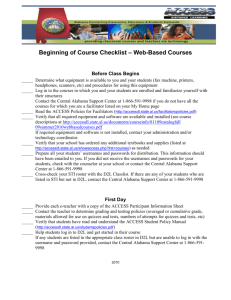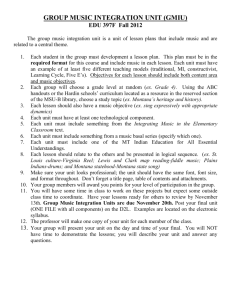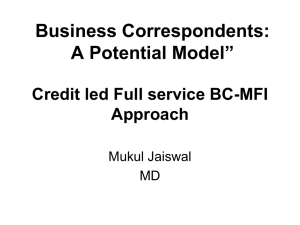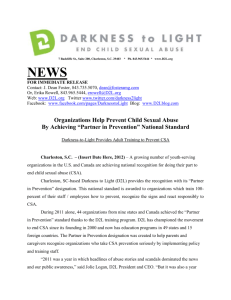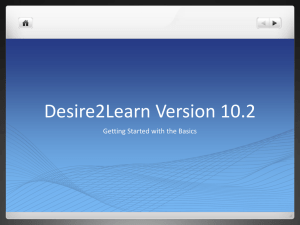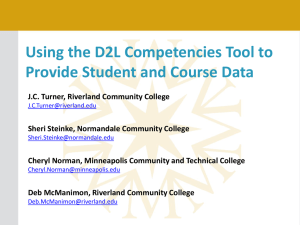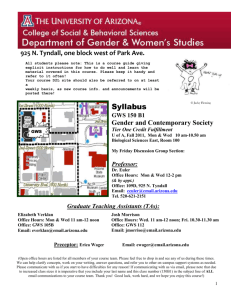Requirements - University of Wisconsin Colleges
advertisement
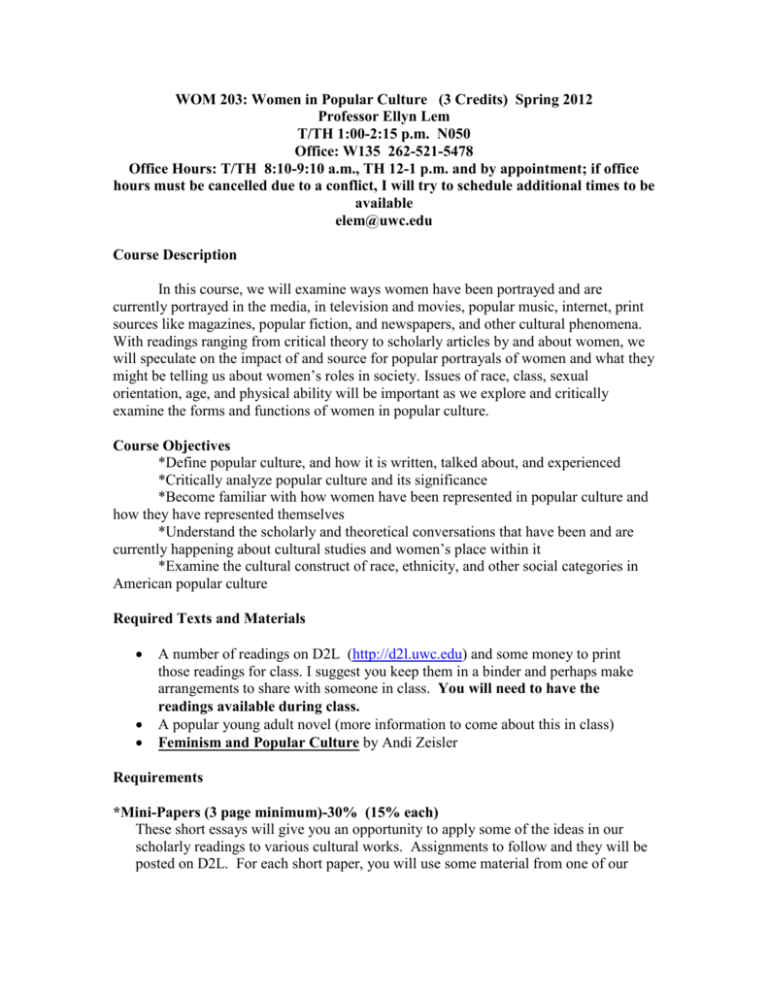
WOM 203: Women in Popular Culture (3 Credits) Spring 2012 Professor Ellyn Lem T/TH 1:00-2:15 p.m. N050 Office: W135 262-521-5478 Office Hours: T/TH 8:10-9:10 a.m., TH 12-1 p.m. and by appointment; if office hours must be cancelled due to a conflict, I will try to schedule additional times to be available elem@uwc.edu Course Description In this course, we will examine ways women have been portrayed and are currently portrayed in the media, in television and movies, popular music, internet, print sources like magazines, popular fiction, and newspapers, and other cultural phenomena. With readings ranging from critical theory to scholarly articles by and about women, we will speculate on the impact of and source for popular portrayals of women and what they might be telling us about women’s roles in society. Issues of race, class, sexual orientation, age, and physical ability will be important as we explore and critically examine the forms and functions of women in popular culture. Course Objectives *Define popular culture, and how it is written, talked about, and experienced *Critically analyze popular culture and its significance *Become familiar with how women have been represented in popular culture and how they have represented themselves *Understand the scholarly and theoretical conversations that have been and are currently happening about cultural studies and women’s place within it *Examine the cultural construct of race, ethnicity, and other social categories in American popular culture Required Texts and Materials A number of readings on D2L (http://d2l.uwc.edu) and some money to print those readings for class. I suggest you keep them in a binder and perhaps make arrangements to share with someone in class. You will need to have the readings available during class. A popular young adult novel (more information to come about this in class) Feminism and Popular Culture by Andi Zeisler Requirements *Mini-Papers (3 page minimum)-30% (15% each) These short essays will give you an opportunity to apply some of the ideas in our scholarly readings to various cultural works. Assignments to follow and they will be posted on D2L. For each short paper, you will use some material from one of our readings along with performing your own analysis on an appropriate text. You can choose to do two out of three. *Oral Presentation-15% Early on in the semester, everyone in class will select either one of our readings or another topic that could fit under one of our units (see the syllabus headings). For the presentations, which will be done with other group members, you will need to prepare several thought-provoking discussion questions, one possible in-class writing assignment, and some visual or audio component (a clip, a cartoon, song, etc.) to keep the class engaged. At some point, be prepared to discuss the significance of your article or topic. You will need to turn in a written version of your presentation on the assigned day for me to evaluate it. Try to keep the presentation to ten minutes in length. Presentations cannot be “made up” if you are absent. More specific instructions can be found on D2L. *Final Examination-30% The exam mostly will be essay and short answer. It will cover terms, the readings, and in-class discussion primarily. *In-class Assignments-15% Not only am I writing teacher who believes in giving students every opportunity to work on their written expression, I also recognize that writing is a way to help people think through complex issues as opposed to just discussing a topic right away. Of course, I am interested, too, in knowing who is keeping up with the reading and want to give you incentive to read out assignments. You should expect, then, some kind of written assignment (otherwise known as “quiz”) most days. Sometimes the quiz might be from a student’s oral presentation, or it will be of my own devising. You have been warned! *Good Citizenship-10% Everyone will start with a full 100 points with the assumption that you all will work to create a respectful class environment. However, any of the following actions will result in a five point reduction: using an electronic device in class (e.g., texting, Facebook during class), coming to class five minutes after it has begun or leaving class early without notification, flagrant rudeness and/or disrupting class in any other way. On the positive side, regular active participation in class will result in your final grade being raised to the next grade (e.g., B- to a B). Keep in mind, though, that active participation does not mean talking all the time; it also means active listening, responding to others’ comments in a thoughtful manner, and/or putting in extra effort outside of class by coming in to office hours with questions and comments. My grading scale: 100-93 A 92-90 A89-88 B+ 87-83 B 82-80 B79-78 C+ 77-73 C 72-70 C69-68 D+ 67-63 D 62-60 D59 or below F Attendance: You must come to class each time, prepared by having done the reading and taken notes, in order to succeed in this course. If you must miss a class, please find out from another student what you may have missed in addition to the material that we covered that day according to the syllabus. You are allowed 3 unexcused absences before your final grade will be lowered. Each absence after that will lower the final grade by a letter grade. Missing 6 classes without an excused absence will result in failing the course. Also keep in mind that in-class assignments cannot be “made up” if you are not in class. Excused absences are considered religious holidays and documented medical visits. Students with Disabilities: Please let me know if you have disabilities that need special accommodation. I would be happy to work with you in conjunction with Judy Becker of Student Services Academic Honesty: The Board of Regents, administrators, faculty, academic staff and students of the University of Wisconsin system believe that academic honesty and integrity are fundamental to the mission of higher education and the University of Wisconsin system. The University has a responsibility to promote academic honesty and integrity and to develop procedures to deal effectively with instances of academic dishonesty. Students are responsible for the honest completion and representation of their work, for the appropriate citation of sources, and for respect for others’ academic endeavors. Students who violate these standards must be confronted and must accept the consequences of their actions. Assessment: The UW Colleges-wide assessment program was established to enhance the quality and effectiveness of the curriculum, programs, and services of the institution. The institution-wide assessment activities focus on analytical, quantitative, communication, and aesthetic skills because they are of primary importance in the general education of our students. This semester, students in all women's studies courses will be assessed on analytical skills. We will also conduct an assessment of student learning specific to the discipline of women's studies. Schedule Week One: Introduction to the course TU 1/24 Learn about the course; brainstorm oral presentation topics besides syllabus readings; demonstrate D2L; look at “Fear of Femininity: Why Young Women Get the Willies” TH 1/26 Have read Chapter One in Feminism and Popular Culture (FPC); in class, discuss important feminist theory terms TU 1/31 Have read Chapter Two and Three in FPC TH 2/2 Have read Chapters Four and Five in FPC The Visual Spectacle: Television and Film TU 2/7 Have read “What’s Wrong with Cinderella?” (D2L under “Cinderella”) TH 2/9 Have read “You Go Girl” (D2L) TU 2/14 Have read “This Tween Bridge Over My Latina Girl Back” (D2L) TH 2/16 Watch the original Swedish film, Girl With a Dragon Tattoo (readings on the film TBA) TU 2/21 Finish watching the film and discussion Popular Music, Music Culture, and Performance TH 2/23 Have read “The Naval, the Corporate, the Contradictory: Pop Sirens at the Twenty-first Century” (D2L); in class, discuss “The Rock and Roll Hall of Fame’s Women Problem” (D2L) TU 2/28 In class, watch part of Dreamworlds 3: Desire, Sex and Power in Music Video and Bro Code; have read “Swift Judgment” (on Taylor Swift) and “Sass and Cadence” (on Pink) both D2L; Mini-paper on Film/TV due TH 3/1 Have read “Woman to Woman: Building Solidarity in African American Female Comedy” and “Do Bitches Get Stuff Done” (on Tina Fey) (D2L) Print Media--Magazines, Fiction, Newspapers, Comic Books TU 3/6 Have read “The Personal is Political: Women’s Magazines for the ‘I’m-Not-a-Feminist-But’ Generation” (D2L) and “Sex R Us” (D2L) TH 3/8 Have read “Battled in Every Man’s Bed: Playboy. . . .” (D2L) TU 3/13 Have read “Reading Wonder Woman’s Body” (D2L); discuss presentation of a popular young adult novel featuring a central female protagonist TH 3/15 Have read the “Nancy Drew” article from American Sweethearts Spring Break—Enjoy!! TU 3/27 and TH 3/29: Presentations on young adult novels Material Culture (Toys, Games, Technology, and Other Consumables) TH 3/29 Have read “Little Hotties” on the Bratz dolls (D2L) TU 4/3 Have read “’It’s a Girl Thing’: Tough Female Action Figures in the Toy Store” (D2L) and “Half Baked” (D2L); Mini-paper on Music or Print Media is due TH 4/5 Watch Game Over: Gender, Race and Violence in Video Games in class and have read “Girls Gaming and Trajectories of IT Experience” (D2L) TU 4/10 Have read “Progression on Nickelodeon? Gender-role Stereotypes in Toy Commercials”(D2L) TH 4/12 No class. . . I will be at the National Pop Culture Association Conference in Boston. . . . promise to bring back something for the class! Advertising and Marketing TU 4/17 Have read “Madison Avenue Versus The Feminine Mystique” and “Narcissim as Liberation” (both D2L) TH 4/19 In class, study advertisements from different periods. TU 4/24 View the documentary Killing Us Softly 4 TH 4/26 Have read a selection from Provocateur (D2L) on images of women and minorities in advertising Food Feminism? TU 5/1 Have read “Democratainment: Gender, Class, and the RachelMartha Continuum” (D2L) TH 5/3 Have read “Bootylicious: Food and the Female Body in Contemporary Black Pop Culture” (D2L) TU 5/8 Prepare for the final in class and create a study guide Final Exam: Friday, May 11 1-3 p.m.; Mini-paper on Material Culture/Advertising is due

